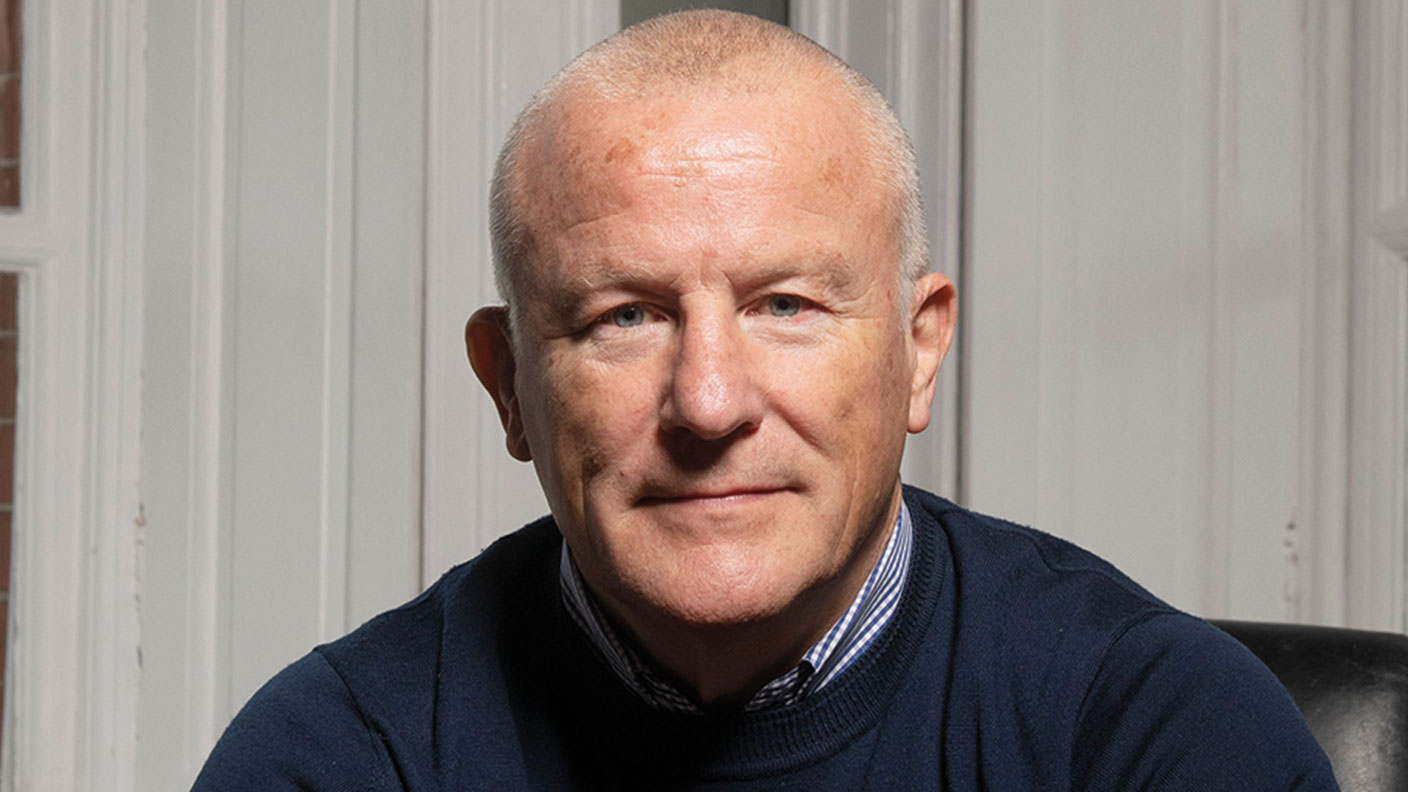The star fund managers who fell to earth
Neil Woodford's reputation as Britain’s top fund manager has taken a few recent hits. Sarah Moore looks at what lessons investors can learn from his misfortunes.
Get the latest financial news, insights and expert analysis from our award-winning MoneyWeek team, to help you understand what really matters when it comes to your finances.
You are now subscribed
Your newsletter sign-up was successful
Want to add more newsletters?

Twice daily
MoneyWeek
Get the latest financial news, insights and expert analysis from our award-winning MoneyWeek team, to help you understand what really matters when it comes to your finances.

Four times a week
Look After My Bills
Sign up to our free money-saving newsletter, filled with the latest news and expert advice to help you find the best tips and deals for managing your bills. Start saving today!

Neil Woodford has seen his reputation as Britain's top fund manager take a few hits over the past year.You don't need to feel any delight in his misfortune to learn a few lessons, says Sarah Moore.
There's an old adage in investment that as soon as something appears on the cover of a magazine, the trend is about to turn. So investors in Neil Woodford's funds may find it reassuring to see him appear as Ozymandias on the front of MoneyWeek this week. And as it happens, at the time we went to press, shares in his Patient Capital Trust were soaring after Prothena, a major holding in the trust and also in the Woodford Equity Income Fund, announced a deal with biotech firm Celgene that could be worth as much as $2.2bn (£1.6bn).
If you remain sceptical and prefer to sell, this might simply offer a better opportunity to do so. But regardless of what happens to Woodford's funds from now on, the reality is that over the last couple of years, his investors' patience has been sorely tried. Some of this can of course be attributed to the sheer unpredictability of markets nobody can outperform all the time. But as with a number of other notable investors who went off the boil, one doesn't need to trash their records entirely to learn some useful lessons from their misfortunes.
MoneyWeek
Subscribe to MoneyWeek today and get your first six magazine issues absolutely FREE

Sign up to Money Morning
Don't miss the latest investment and personal finances news, market analysis, plus money-saving tips with our free twice-daily newsletter
Don't miss the latest investment and personal finances news, market analysis, plus money-saving tips with our free twice-daily newsletter
Stockpicking is hard work
Until his recent wobbles, Woodford had built a strong reputation over a long career. He was seen as a value investor, avoiding companies that look expensive (such as tech companies during the dotcom bubble of the late 1990s and banks before the financial crisis) and favouring unfashionable sectors and defensive stocks. Today, he is unquestionably the most famous fund manager still working in the UK.
Woodford joined asset manager Invesco Perpetual in 1988. Between 1988 and 2014, Invesco Perpetual High Income, the main fund he managed, returned an annual average of 13.24%. If you'd invested £1,000 into the fund at its inception, it would have grown to £25,349 by the time he left. If you'd put the same amount into the FTSE All-Share, it would have made just £10,351, an annual return of 9.3%.
When Woodford left Invesco to set up his own company Woodford Investment Management it came as no surprise that investors followed in droves, eager for their investment success not to end with his departure. And at first, it seemed that they were vindicated in their decision. In the first two years the fund returned just over 20%, relative to an average of 9.7% from similar funds. However, Woodford has famously experienced a colossal run of bad luck over the past couple of years. At least once every few months there is another story about a company in his portfolio that is struggling doorstep lender Provident Financial (whose stock fell 67% in just one day on the news of a second profit warning and a dividend cut) and motoring-services firm AA (whose stock fell 33% on the news of a profit downgrade and dividend cut) being just two examples of many. Since June last year, shares in the fund have dropped by over 16%, with assets under management falling from a £10.2bn high a year ago, to today's £7.72bn. In 2017, the fund returned just 0.53%, relative to over 11% for the average fund in the Investment Association UK Equity Income sector. It's important to point out that Woodford has had some notable wins over the past few years online estate agent Purplebricks, litigation-finance firm Burford Capital and travel-booking site Hostelworld to name but a few but these successes have rather been overshadowed by the poor performance of other holdings.
It's difficult to draw a definitive conclusion about what's caused Woodford's woes at this point: it's possible that his fund will see a reversal in its fortunes. However, the string of flops shows that stockpicking is no easy feat. Running billions of pounds of investors' money across lots of stocks is difficult, even with the vast resources of a huge firm behind you. Since leaving Invesco, Woodford no longer has the same amount of support, and has still launched three large funds in a relatively short period of time. His Equity Income Fund alone has over 120 holdings, and many of these are small unlisted companies. This takes up a lot of research time and some critics have suggested that this may have contributed to him not spotting pending problems at some of his holdings (of course, in fairness many other investors missed these issues as well).
Success doesn't always travel
Before Woodford, Anthony Bolton held the title of Britain's most famous investor. Bolton can be described as a contrarian value investor someone who wants to invest in cheap, under-appreciated companies that have been undervalued by the market. He took a "bottom-up" approach to investing, carrying out extensive research into a company's business model and prospects. His Fidelity Special Situations fund returned 19.5% per year from December 1979 to December 2007, relative to 13.5% for the FTSE. A £1,000 investment would have turned into £147,000 over that period.
Bolton retired as a full-time fund manager in 2007, only to surprise investors by returning to manage the Fidelity China Special Situations fund in 2010. The move was greeted with some bafflement in the investment community. Bolton had apparently visited China for the first time in 2003, didn't speak the language and had no plans to learn it. But despite concerns that the value investing style that won him such high regard in the UK would not translate to China, investors flocked to the new fund in droves it raised £460m at launch.
Unfortunately, these concerns turned out to be well-founded. The trust lost 5% in its first year, and 26% in its second. One of the most significant factors behind this seems to have been Bolton's apparent misunderstanding of the business culture in China, and underestimation of the extent to which poor corporate governance and fraud would affect his ability to select promising companies.
The chairman of the China Special Situations fund also blamed its underperformance on a bias to small and medium-sized companies that had not fared well in the years following the global recession, notes Morningstar, the fund analysis and data firm. Bolton himself has said that he thinks the trust's level of borrowing played a significant role in its underperformance (ie, it had borrowed too much to invest, amplifying losses). Bolton eventually stepped down in 2015. Despite the fund's disappointing performance during his stint, it still beat the market by a small amount, but at a time when Chinese stocks performed poorly, so most investors were not happy.
One key lesson to take from Bolton's foray into China is that just because an investment strategy has worked in one market at a particular time does not mean that it will translate into a different market at a different time. Don't underestimate the importance of a fund manager or team who are at home in a geographic area and familiar with its culture. It's also worth noting Bolton's comment about the impact of leverage borrowing to invest often goes wrong.
Beware an overconfident manager
Bill Miller is not a name that will be very familiar to most British investors, but in the US he enjoyed an outstanding reputation for many years. His Legg Mason Capital Management Value Trust fund beat the S&P every year from 1990 to 2005 a feat no other manager had achieved.
Miller is often described as a value investor, making big bets on under-appreciated companies with strong business models. That said, it's fair to say that Miller operated on a fairly broad definition of value investing. "He ran a fund with value' in its name that feasted on technology stocks that no other fundamental stockpicker would touch," says Jason Zweig in The Wall Street Journal. "He bought Amazon during the internet bubble. He bought Google in its initial public offering, when it was considered insanely overvalued by many."
Miller's extreme confidence in his convictions was famously portrayed in the film The Big Short, in which a character called "Bruce Miller" defends his bet on ill-fated investment bank Bear Stearns (which was bailed out by the US Federal Reserve ten years ago this month), even while other traders run out of the conference, BlackBerrys in hand, to try and sell their stock. However, his style would eventually trip him up. In the years leading up to the financial crisis of 2007-2008, he mistakenly bet that the housing and financial sectors would not fall more than they already had. Where his willingness to stick with distressed technology and industrial stocks had made him a lot of money in the previous two decades, this strategy failed him during the crash. Shares in the Value Trust fund dropped by 55% in 2008, relative to 37% for the S&P 500 over the same period. Although returns improved in 2009 and 2010, investors had already lost faith in Miller. He remains an active manager, having bought the management contract from the Value Trust from Legg Mason, but it's fair to say he no longer enjoys the widespread public adoration he once received.
One lesson to learn from Miller is that style drift (ie, where a manager's investment approach and the type of stocks they hold changes radically over time) can be cause for concern even where the manager remains supremely confident in his investment decisions. Where investors may have bought into the fund expecting value investing, they ended up with a fund that invested in companies many saw as overvalued, and a manager who refused to acknowledge when a sector was on the verge of collapse. In addition, while strong convictions are often a good thing, in Miller's case that led to portfolios concentrated in certain sectors that suffered during the crisis. High conviction needs to be combined with strong risk management.
Size is not always an advantage
Famed bond fund manager Bill Gross joined Pacific Mutual Life as an investment analyst in 1971, having put himself through business school by playing blackjack professionally. From then until 2014, Gross worked as chief investment officer for the Pacific Investment Management Company, or Pimco, which he co-founded. At its height the company looked after $2trn in assets. His Total Return Fund consistently outperformed its rivals, returning 164% in the 15 years prior to his departure, relative to an industry average of 116%.
Gross' investment strategy involved setting out what he expected to happen to the economy and interest rates over a three-to-five-year period, and then structuring his portfolio in order to try and take advantage of mispricings. His most famous call was probably to buy stakes in bonds linked to Federal housing agencies Fannie Mae and Freddie Mac shortly before the US government stepped in to rescue them.
Gross' opinion was held in such high regard that he once received a phone call at home from the US treasury secretary they apparently chatted for half an hour about what to do about the US economy. This "says something about the role [Gross occupied] in finance, and especially the world of bonds... He [was] constantly sought out for his views, which at times represent market-shifting news", says Joanna Slater in The Globe & Mail. Alongside this influence came some eccentricities. Gross reportedly once ran more than 120 miles over a six-day period, not stopping even when he ruptured a kidney. On the day of his interview with The Globe & Mail, he decided to start an impromptu conga line past "rows of stunned-looking traders".
He was also known to leaves notes on traders' desks querying their positions before they got into work at 4am. Gross was eventually pushed out of Pimco in 2014, amid allegations of increasingly erratic behaviour and treatment of colleagues, as well as weak returns at the bond fund in the three preceding years. He made the wrong call on US Treasury bonds in 2011, and saw Total Return's assets under management fall from $293bn in 2013 to $222bn.
Gross has said that his Total Return Fund became a victim of its own size. It is difficult for funds to beat a market in which they occupy such a large position. "In such a big fund, even minor portfolio weighting tweaks would be a potential nightmare", said the Financial Times' Alan Livsey at the time. "A 1% shift is over $2bn. Presumably trying to get traders to take on risk for one of their larger shifts in the fund, 3% or 4% of the portfolio, would have caused headaches...Really it's a miracle, and a testament to [Gross'] skill as a manager, that Total Return did as well as it did for so long." Investors should be aware of this danger when investing in similarly large funds.
Tips for picking an active manager
The fact that star fund managers such as Woodford, Bolton, Miller and Gross sometimes come a cropper is not a reason to avoid active fund management (although it is worth recalling that most active funds underperform the market and that your default position should consequently be a cheap passive fund rather than an active one). You may find a manager who has the skill and the conviction to provide returns better than those that you would receive from an index tracker. However, it's important to consider why you expect the manager to do the job, rather than simply investing with whoever is all over the news for doing well recently (which is what many investors who put money with star managers are doing).
First, you ideally want to invest with a manager that runs a concentrated, high-conviction portfolio with low turnover (to avoid excessive trading fees). However, the flip side of high conviction can mean reckless investing, so look for managers whose portfolios are still sensibly diversified and are not betting everything on a few companies or a couple of economic outcomes.
It may be a good sign if a fund manager owns shares in their own fund. This at least shows they are putting their money with their mouth is. If the manager runs their investment firm, that can also be encouraging in general, funds that do something distinctively different are more likely to come from small boutique investment firms run by the managers than by big asset managers whose main objective is to gather and retain as many client assets as they can to earn fat fees.
So which big-name investors might qualify? Nick Train and Terry Smith both run small portfolios of high-quality growth companies that they think will be around for the long term. Train's Finsbury Growth & Income Trust (LSE: FGT), which invests in UK-listed equities, counts among its top holdings drinks maker Diageo and fund supermarket Hargreaves Lansdown, and has an ongoing charge figure (OCF) of 0.7%. Over five years it has returned 81%, with dividends reinvested, relative to the FTSE All Share's 38%. Smith's Fundsmith Equity Fund invests across the world, with 62% of its portfolio in the US, 18% in the UK, and smaller allocations to Spain, Denmark and Finland. It has returned 138% over five years, and has an OCF of 0.97% (however, we'd note that Smith's record is less compelling with his emerging markets fund perhaps this will be another case of a strategy that doesn't travel). Alternatively, if you want very high-conviction management, consider the Aurora Investment Trust (LSE: ARR), managed by Gary Channon. This trust follows a value strategy investing in UK-listed stocks, and only holds between 12 and 20 companies at any one time. It has an OCF of 0.8%
Disclosure: Sarah holds Finsbury Growth & Income Trust, Fundsmith Equity, as well as Woodford Equity Income.
Get the latest financial news, insights and expert analysis from our award-winning MoneyWeek team, to help you understand what really matters when it comes to your finances.
Sarah was MoneyWeek's investment editor. She graduated from the University of Southampton with a BA in English and History, before going on to complete a graduate diploma in law at the College of Law in Guildford. She joined MoneyWeek in 2014 and writes on funds, personal finance, pensions and property.
-
 Should you buy an active ETF?
Should you buy an active ETF?ETFs are often mischaracterised as passive products, but they can be a convenient way to add active management to your portfolio
-
 Power up your pension before 5 April – easy ways to save before the tax year end
Power up your pension before 5 April – easy ways to save before the tax year endWith the end of the tax year looming, pension savers currently have a window to review and maximise what’s going into their retirement funds – we look at how
-
 Neil Woodford’s back – but has he really learned anything?
Neil Woodford’s back – but has he really learned anything?Opinion Disgraced fund manager Neil Woodford is planning a comeback. But he doesn’t seem to have learned much from his many mistakes. So why would anyone invest with him now?
-
 Neil Woodford’s back – but sometimes sorry isn’t enough
Neil Woodford’s back – but sometimes sorry isn’t enoughAdvice Neil Woodford’s funds blew up in 2019. Now he is on the comeback trail. But his apologies are unconvincing.
-
 Woodford investor? Your first payment is coming soon
Woodford investor? Your first payment is coming soonNews Private investors left stranded by the collapse of the Woodford Equity Income fund will soon be getting at least some of their money back. But they will have to wait a while longer to see how much more – if any – they will receive.
-
 Neil Woodford continues to cast a shadow over his successor at Invesco
Neil Woodford continues to cast a shadow over his successor at InvescoFeatures Mark Barnett, former star manager Neil Woodford’s successor at Invesco, has applied the same formula, and is struggling.
-
 Is it time to buy Patient Capital Trust?
Is it time to buy Patient Capital Trust?Features Neil Woodford’s Patient Capital Trust has been taken over by asset manager Schroders. The share price has surged - but should you buy in? John Stepek looks at the trust’s prospects.
-
 Neil Woodford: no silver lining for his investors
Neil Woodford: no silver lining for his investorsEditor's letter Neil Woodford made every mistake it is possible to make as a money manager. And his investors have been stiffed. But however wrong it all went, Woodford never stopped taking the fees.
-
 Woodford believed his own hype – now his investors are paying the price
Woodford believed his own hype – now his investors are paying the priceFeatures Neil Woodford was once one of the brightest stars in Britain’s investment firmament. Then he came crashing down to earth. John Stepek explains what went wrong.
-
 Woodford’s empire collapses – what happens to his investors now?
Woodford’s empire collapses – what happens to his investors now?Features With Neil Woodford getting his marching orders and his funds being shut down, John Stepek explains what it means for his former empire, and for those with money locked in.